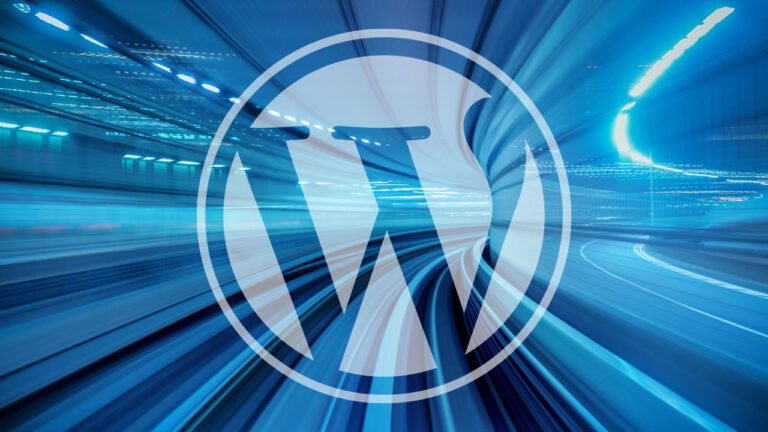
Table of Contents
Speeding up your webpage brings about countless benefits. It makes your site visitors happier, improves your page views, and ultimately helps with SEO. Unfortunately, WordPress doesn’t always make it easy for you to deliver lightning-fast pages to your visitors. This 2024, we’re here to help you optimize your website by providing our list of tried-and-true WordPress plugins and discovering how WordPress development website correction goals play an important role.
Understanding Website Speed
Website speed, sometimes referred to as website performance, is the duration of time between a link being opened and the moment that it is fully loaded. It is a quantifiable measurement of how fast a webpage loads when a user clicks on its link. This includes processing and rendering its contents to make it available for an online visitor to check out. A WordPress web design agency specializes in optimizing these aspects, ensuring that websites not only deliver compelling visuals but also exceptional performance, crucial for keeping visitors engaged.
What is a good website speed?
It is generally recommended for your site to present visual content within the first two seconds and to be interactive within the first five seconds. Google generally favours pages with a 90 or above PageSpeed Insights (PSI) score.
Importance of Speed for WordPress Sites
No one likes webpages that load slowly, and especially not Google. Some site owners may neglect the website speed in favour of a more aesthetic design, extra interactive features, or to squeeze in more content on a single page. In reality, not a lot of users really care about this gimmickry and they’re probably more concerned about looking at the value your webpage has to offer. More importantly, your website speed inadvertently affects your search engine rankings. Here are 3 reasons why speed for WordPress sites is important:
1. Secures an impressive user experience
The first impression matters, and even more so for websites. When a new visitor goes to your site for the first time, they have expectations that it will load within 3 seconds or less. This is valuable because it forms their impression of you and your business. The speed greatly affects how they perceive your brand and if you’re a business that is worth purchasing from. Deep down, the majority of us subconsciously link a fast loading speed with professionalism, reliability, and authority. Conversely, a webpage that loads slowly is annoying and unprofessional which may trigger users to click away and take their business elsewhere.
Research conducted by Kissmetrics revealed that up to 40% of users completely abandon a site if its loading speed is longer than 3 seconds. So if you want to entice your visitors to stay and check out what the rest of your site has to offer, work on your website speed.
2. Impacts SEO rankings
Google has repeatedly stressed the importance of a fast website speed. According to Matt Cutts who is the former head of Google’s web spam, a fast load speed is an impactful ranking factor. Having a slow website speed means that Google will not send as many crawlers to your website, which translates to them being less likely to rank your latest updates and posts. All of this leads to decreased visibility. However, Google did stress the importance of valuing content and relevancy so these should not be compromised when you are working towards improving your website speed.
3. Improved conversion rates
A conversion rate refers to the percentage of users who have fulfilled your desired action. The formula for this is taking the total number of users who “converted” and dividing that by the overall size of the audience.
But why is this important? The conversion rate is essentially the quantifiable measurement of how well your website performs. This goes beyond the number of clicks you get or the level of engagement your landing page accumulates. It can also pertain to the number of visitors who engaged with your site long enough to purchase something, subscribe to your mailing list, or whatever your desired action may be.
Your website load speed affects the conversion rate because people are naturally impatient and may feel frustrated at the slightest delay, which will make them leave your site. Need more proof of how this may affect your conversion? Amazon conducted a test on website speeds and discovered that if they reduced the loading time by a single second, they’d miss out on up to $1.6 billion in sales annually.
Choosing the Right Speed Optimization Plugins
Here are some of the key factors to consider when choosing the right speed optimization plugins for your WordPress site:
- Compatibility: Check if your plugin of choice is compatible with your current WordPress version. Additionally, some plugins may not work with specific themes or may counteract other preexisting plugins.
- Price: Some WordPress plugins are free while others require payment. The best choice should fit within your budget while offering you the features you need for your business. It’s unnecessary to purchase a feature-packed plugin if you are not going to use all of it in the first place.
- Ease of use: Plugins with user-friendly interfaces let you easily integrate them into your site. The UX/UI should help you easily access the features you need so you may optimize your site while allowing you to monitor the important performance metrics.
- Performance: Your plugin of choice should have a proven track record of effectively boosting website loading speeds. For this, thoroughly research online reviews and customer testimonials to gauge the reputation of the plugin developer.
Best WordPress Speed Optimization Plugins
- Hummingbird Pro by WPMU Dev: Hummingbird Pro helps you optimize your images and minify your JavaScript and CSS files to improve your website load speed. It is an excellent caching plugin that automatically creates cached versions of your webpage.
- Smush Pro by WPMU Dev: Smush Pro is known for its powerful image optimization which allows your site to load quickly without sacrificing image quality. On top of that, it also automatically offloads plugin integration and offers CDN so that your site loads faster relative to your user’s geographical location.
- WP Rocket: This popular caching plugin is a one-stop shop that covers multiple fields to boost your loading time. For instance, its focus on Core Web Vitals offers all-around support to ensure that every single element on your site is optimized to load as quickly as possible. It also leverages the feedback from your PageSpeed performance score and builds on the insights to help improve your site speed.
- LiteSpeed Cache: This acceleration plugin is equipped with cache management tools that support dynamic content on WordPress sites. This is powerful and flexible as it is integrated into the LiteSpeed Web Server.
- WP-Optimize: This focuses on optimizing your WordPress database by cleaning up unnecessary data, optimizing database tables, and reducing its size. The only downside is that it does not possess extensive caching features.
- Jetpack Boost: This is an optimization plugin developed by Automattic – the exact same company behind WordPress.com. It is packed with features such as image lazy loading, deferred JavaScript loading, and other performance enhancements.
Plugin Configuration And Installation
Before you can install and configure a plugin, first make sure that your account is upgraded to the WordPress.com Business Plan. Then, head over to the WordPress directory and search for your chosen plugin. To install it, go to “Plugins” > “Add New” > Click on the plugin > “Install and Activate.”
If your chosen plugin is not listed in the directory, simply upload its corresponding zip file which you can get directly from its developer. Follow the installation instructions that come with the plugin.
Advanced Tips To Speed Up Your WordPress Site
Here are advanced techniques to help you boost your WordPress website loading speed even further:
- Detect poor-performing components
There are WordPress plugins and themes that may further slow down your site and you should be mindful of these as they can severely impact your site’s performance. While your first instinct might be to remove them, you may simply look for alternatives that offer the same features and swap them out.
To detect poor-performing plugins and themes, check for:
- Insufficient queries
- Double loading of resources
- Calls to nonexistent resources or external scripts
- Improve the fonts
Do not load fonts that aren’t being used by your site. Additionally, it is recommended to load Type Fit and Google Fonts locally. Only preload fonts when it’s necessary and appropriate to ensure that the fonts are readily available and can be delivered. You can also use a plugin like the OMGF or Optimize My Google Fonts which allows you to locally host your Google fonts.
- Server-level Page Caching with Object Caching
Many caching plugins handle page caching at the application level but you might want to consider implementing server-level caching, especially if you are using a server that supports it.
Pairing server-level page caching with object caching can further optimize dynamic elements on your site and reduce the need to repeatedly query the database. To achieve this, you’ll need to work with a developer or system administrator. Additionally, ensure that you have access to server configurations.
- Optimizing Your Content Delivery Network (CDN)
CDN optimization involves strategically fine-tuning cache settings, utilizing features like HTTP/2 and Brotli compression, and configuring edge servers. Additionally, using a CDN with smart routing capabilities can dynamically select the optimal server based on real-time conditions for the fastest content delivery.
Testing and Monitoring Performance Improvements
Here are 3 of the most popular tools to test your WordPress website speed:
- SuperbThemes Page Speed Checker: One of the strongest features of this tool is that it focuses on offering solutions to WordPress website owners compared to other platforms that dwell heavily on technical explanations. To use this, simply type in your URL and click the “Check Pagespeed” button to get your insights. It will provide an overall grade as well as 4 major indicators which include server load time, content load time, fully loaded time, and on-page SEO.
- Google’s PageSpeed Insights: This tool lets you see how Google views your website. It started as a tool to audit mobile-friendly websites but has transformed into a highly complex software that also covers overall site performance, accessibility, SEO, and recommended best practices. It uses Core Web Vitals metrics to give your website a score.
- WebPageTest: This tool is straightforward to use, with the added benefit of offering users control over the testing conditions. For example, if you want to target a regional market, then this lets you test your site from the closest servers. This also rates your site based on metrics such as time to first byte, first contentful paint, largest contentful paint, cumulative layout shift, total blocking time, and page weight.
Conclusion: Ensuring Lasting Speed Optimization
WordPress plugins are wonderful tools you can leverage to improve your WordPress website speed. Through our recommendations, you can enhance the user experience, improve your rankings, and drive more traffic to your site – all of which lead to better conversions.
